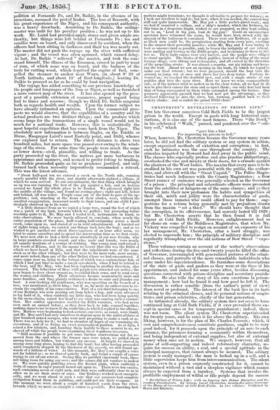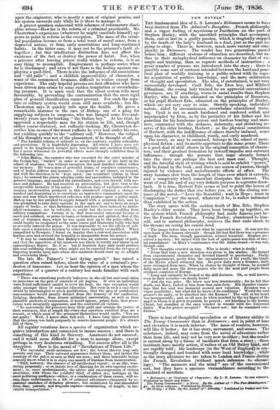CHESTERTON' S REVELATIONS OF PRISON LIFE: * THE late Governor conceives
Cold Bath Fields to be the largest prison in the world. Except in gaols with long historidi asso- ciations, it is also one of the most famous. There "the Devil," in his celebrated. " Walk," paused, and pondered over the " soli- tary cell," which
"gave him a hint For improving his prisons in hell."
When, however, Mr. Chesterton became the Governor many years later, he did not find the solitary system or any system in action, except organized methods of extortion and corruption ; in fad, such he intimates was the case throughout the country. The stimulus imparted by Howard had died away in thepublic mind. The classes who especially profess and. also practise philanthropy, overlooked the vice and misery at their doors, for a crusade against the planters of the West Indies. The maxim that every man is to be credited in his own art was powerful with the public, the author- ities, and above all with the " Great Unpaid." The Pollee Magis- trates had much influence with the County Magistrates ; a Bow Street runner of eminence was generally selected as the Governor of a prison ; the principal and subordinate officers were promoted. from the satellites or hangers-on-of the same classes ; and as they brought into their new profession the habits and sympathies of their old, mirth and jollity were the characteristics of gaols, amongst those inmates who' could afford to pay for them ; sug- gestions for a reform being generally met by prejudices drawn from the maxim " set a thief." We should have thought that the corruption, in its effervescence, had scarcely lasted till 1829 - but Mr. Chesterton asserts that he then found it in full vigour at Cold. Bath Fields. However, enlightenment had so far shone on some of the Middlesex Magistrates, that when Mr. Vickery was compelled to resign on account of an exposure of his lax management, Mr. Chesterton, after a hard struggle, was elected to supersede him ; the principle of military discipline and regularity triumphing over the old notions of Bow Street " expe- rience."
These volumes contain an account of the writer's observations and reflections during the five-and-twenty years he filled the office of Governor, intermingled with generalized pictures, of the crimi- nal classes, and. portraits of the more remarkable inclividucds_who came under his superintendence. He furnishes some descriptions of the state of gaols and gaolers as they were at the time of his appointment, and indeed for some years after, besides _discussing questions connected with prison-discipline and' secondary punish- ments. He also tells the story of his own exertions in prison- management ; how bad he found it and how good he left it. The discussion is rather sensible (from the author's point of view) than novel or profound. The interest of the book lies in its facts relating to the criminal classes, and its personal notices of magis- trates and. prison celebrities, chiefly of the last generation.
As intimated already, the solitary system does not seem to have continued long at Cold lath Fields, if it ever prevailed there ex- cept in special cases or for temporary punishment ; indeed, there was not room. The silent system -Mr. Chesterton superintended for twenty years, and he rates it far above the solitary. His own liking, however, is for the plan of Mr. Charles Pearson ; which, if cost and comprehensiveness constitute goodness, ought to be very good indeed, for it proceeds upon the principle of an acre to each prisoner, the prisoners forming a community within themselves, and being independent of external supplies, but also of external money when once set in motion: We suspect, however, that all plans of self-supporting and indeed reformatory character, re- quire for success an ability, a zeal, and a special aptitude in the principal managers, that cannot always be secured. The solitary system is easily managed : the man is locked. up in a cell, and a little supervision keeps him from intercommunication. The silent system, even in a prison expressly constructed for 'it, cannot be maintained without a tact and a sleepless vigilance which cannot always be expected from a turnkey. Systems that involve the profitable employment of wilful or idle people depend for success • Revelations of Prison Life ; with an Inquiry into Prison Discipline and ,Se- condary Punishments. By George Local Chesterton, twenty-five years Governor of the House of Correction at Cold Bath Fields. In two volumes. Published by Hurst and Blackett.
upon the originator, who is.mostlya man of original genius, and -his system succeeds only While he is there to manage it. A graver question connected with schemes of reformatory disei- pline arises—How far is the reform of a criminal practicable. Mr. Chesterton's experience (whatever he might conclude himself) ap- pears-to point to reform as the exception. The mass of the crimi- nal population become so from a total want of moral sense, from a depraved nature, or. from early associations and long-continued habits. In the latter ease, it may not be the prisoner's fault al-
- together; but this intellectual distinction does not affect the existence of the fact or destroy the power o£. habit. Nor, when a prisoner after leaving prison really wishes to reform, is it an easy thing to accomplish. Employment is perhaps scarce when he is orged ; and even if -not there-is the feeling against em- ploying a- gaol-bird. There is also the influence of old associations and " old palls " ; and a childish impressibility of character, a want of the firmness, difficult to realize except from experience. The only hopeful persons are first offenders who have been driven into crime by some sudden temptation or overwhelm- ing pressure. It is upon such that the silent system tells most favourably, by preventing the contamination that the most rigid plan of general classification cannot prevent. For such the se pc- rate or solitary system would seem still more available ; but Mr. Chesterton . says it quickly tells upon the health. He gives a remarkable instance in the case of Bishop, one of a gang for supplying, subjects to surgeons' who was hanged some live-and- twenty years ago. for burking "the Italian boy." At his trial, he appeared a respectable man for his station in life, -and, though rather coarse-featured, not ruffianly-looking. Mr. 6hesterton de- scribes him as one of the worst ruffians he ever had under his care, but yielding quickly to the "solitary. cell." However, the subject of his' thaughta was not of the pleasantest, if he thought at all.
" The harmful tedium of solitude is, on the contrary, equally unhealthy and ernicious. It is frightfully depressing. All whom I have seen ex- to its lengthened ravages have lost weight and condition fearfully, ut I never witnessed its powerful effects more strongly exhibited than in • the following case. " John' Bishop, the monster who was executed for the cruel murder of
the burked' in order to secure the price of his body-in the school of anatomy, was without exception the most finished ruffian within my memory. He was a man of powerful frame, of repulsive countenance, and of brutal address and manners. Consigned to my charge, on remand, and with-the-direction to be a kept -apart,' an occasional custom in those days,) he entered the-prison uttering oaths and-execrations, indulged in the
- grossest language, and assailed the subordinates, and even myself, with me- nace and defiance. He had received no provocation, but gave vent to the irrepressible brutality of his nature. Fourteen days of exclusive self-com- muning incarceration produced in this abandoned criminal a change so marked and depressing as to constitute an instructive commentary upon the -wear and tear -which unrelieved reflection will produce upon a guilty mind.
BialelizailitleTlaw entitled- to supply himself with a generous diet, and he
was. to take daily exercise in the open air, and to have an ample supp y of books ; . so that feebleness could not.have been induced by dimin- ished sustenance, nor be referable to aught but the terror resulting from solitary ruminations. Certain it is that iron-souled miscreant became so
• - meek and subdued, so-prone to tears,-so-tremulous so- tremuloue and agitated, that at the
end of fourteen, days,: when he was again sent -up to the police-office, he could hardly be recognized as the same coarse-and blustering bully who had so recently entered the prison. It wasimpossible to see the effects of soli- tude upon a conscience stricken by crime more signally exemplified. When
• committed to'Newgate, I found on inquiry that a renewed: association with lawless men had revived the brutality so inseparable from his nature. • ".It may be contended_ that Bishop's was an-.extreme example.of guilt, and that the apparition of his misdeeds was likely to terrify and alarm to, n extraordinary degree. Be . it so : but if fourteen_ days only could. produce this soul-subduing change, what might not be expected from. the-ravages of lingering months upon men whose dire misdeeds would start up to -affright
and overwhelm them."
The late Mr. Palmer's " last •-dying speech" has raised a question often raised before, about the value of a criminal's pro- - f.:sion of innocence. Let us hear the opinion of a man whom the experience of a quarter of a century has made fatniliar with such -.assertions.
• " There was something perfectly ludicrous inIthe.all butrmiversal claim to innocence on the part of oonvicta of all degrees. If ever an individual were found sufficiently candid. to avow his belt, the rare exception would arise amongst those of superior education. - But even in such a case there -would be intermingled so much qualification, that the plea of justificatory concomitance would greatly-detract from the honesty of the confession. Judging, _therefore, front almost unlimited asseveration, as well as from • plausible pretexts of.extenuation, it would appear,, prime facie, that prose- cutors were invariably o_ppressors, and-the convicted al victims.
" So universally dul.pnaoners deny their guilt and arraign the justice of
• their sentences, that at length the every=day easel lion extorted- from me a -remark, at which most of the- prisoners themselves-would smile, ' You are not guilty ! Well, Li:now:that full well. - Lhave long _since discovered that the-prison was built purposely ,to receive.innoe,ent people : it's always _full of them.' " All regular vocationa.have a.species of .organization which re- quires intraduction and eonnexionto insure success ; and there is something -of. this -kind in 'thievery. Amateurs do not succeed ; ...and' it would seem difficult - for .0. -man to manage alone except perhapain very dexterous swindling. -Yet success after.1111 is the exception. ion. Here is.the moral of "Revelations of Prison:Life." d;
successful swell-mobsmen are few ; the lowest thieves reap -only • poverty and rags. Their outward appearance betrays them, and invites the •• scrutiny of- the police as soon as they are-seen ' • and these miserable beings . scarcely know what it is to enjoy onamonth of freedom. from incarceration. "Stall, however, the absence of all intellectual vigour; or an idle, wan- dering propensity ; or an innate love of. thieving for its own especial excite- ment ; or, more predominantly, the advice and encouragement of vicious associates, with whom _the youthful thief, of either sex, indulges in the most polluting-proffigeoy—eather,- or a combination of- these causes, will re-
...lain these unfortunates in a life of criminal adventure—chequered by oc- - ,estsional snatches of debasing pleasure' but-embittered by. realdiseomfort :from fear, pursuit, cad frequent capture—terminating, at length, in ine- vitable transportation."



























 Previous page
Previous page